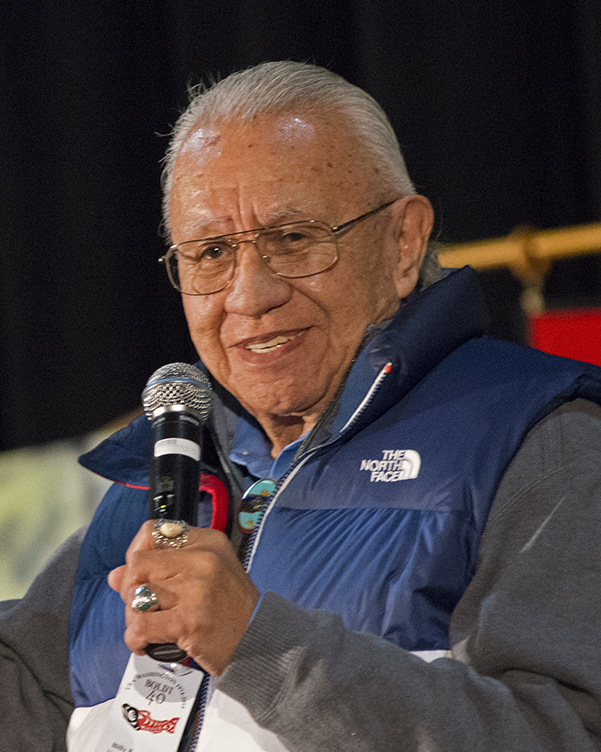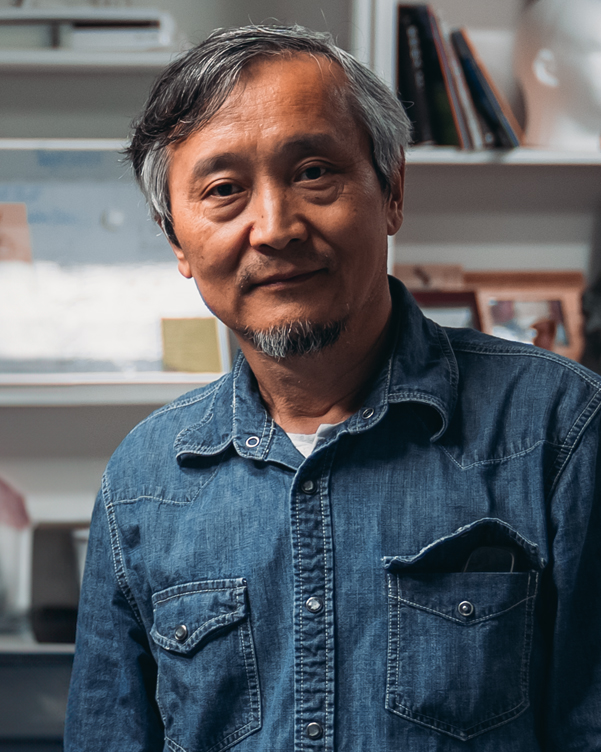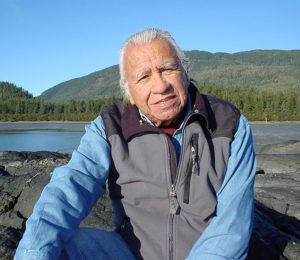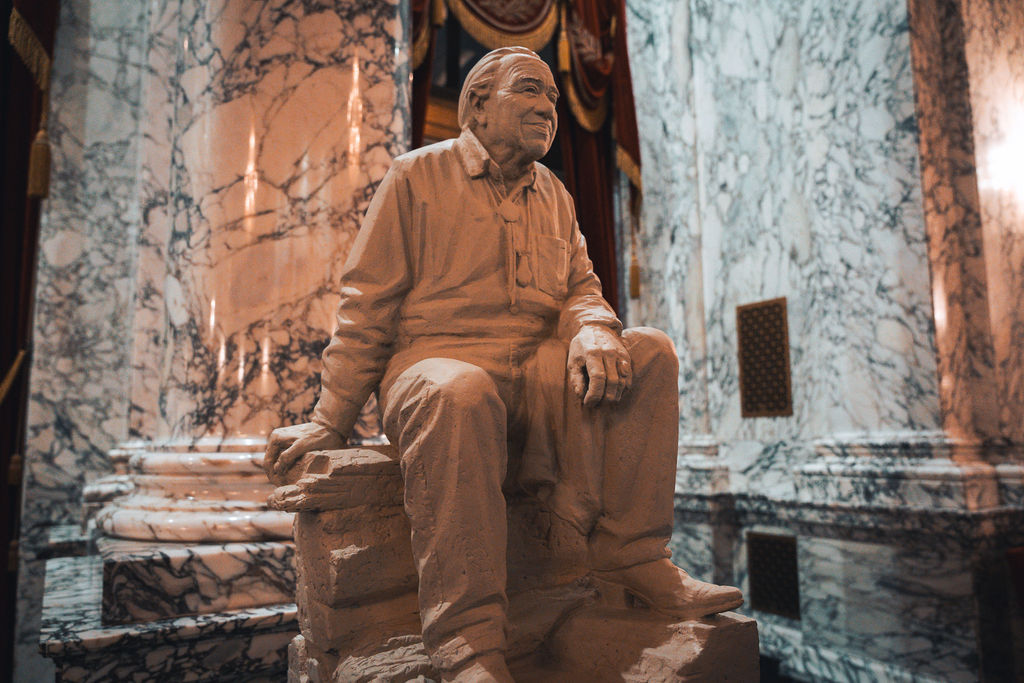Washington State passed legislation in 2021 to send a statue of activist and humanitarian Billy Frank Jr. to National Statuary Hall in Washington, D.C. The statue is currently slated for installation in 2025.

The Subject: Billy Frank Jr.
Billy Frank Jr. was a Nisqually tribal member who fought tirelessly to ensure that the United States government would honor the promises made in the treaties with Washington tribes. His activism and perseverance paved the way for the “Boldt decision” in United States v. Washington, which affirmed the right of Washington treaty tribes to take up to half of the harvestable salmon in western Washington, reaffirmed tribal treaty reserved rights, and established the tribes as comanagers of the salmon resource.

The Legislation: House Bill 1372
Representative Debra Lekanoff (D-40th) introduced House Bill 1372 in 2021 to replace the statue of Marcus Whitman in National Statuary Hall with Billy Frank Jr. The legislation notes that “Billy Frank Jr. dedicated his life advocating for equality, justice, and environmental protections. He fought to protect tribal treaty rights, native cultures and traditions, and the natural resources they are based upon.”

The Artist: Haiying Wu
Haiying Wu was born in China and attended the Sichuan Fine Arts Institute. He worked as a sculptor and created public artworks in China. Wu emigrated to the United States and received his Master of Fine Arts in sculpture from the University of Washington. He has created well known memorials around the Pacific Northwest, including the Fallen Firefighters Memorial in Seattle’s Pioneer Square neighborhood.
Committee meetings
Upcoming meetings:
Wednesday, January 10 | 3:00 p.m. – 4:00 p.m. | Click here to read the agenda
Wednesday, October 11 | 3:00 p.m. – 4:00 p.m. | Click here to read the agenda
Tuesday, March 15, 2022 | 9:00 a.m. – 10:30 a.m. | Click here to read the agenda
Friday, April 22, 2022 | Art selection subcommittee | 9:00 a.m. – 10:00 a.m. | Click here to read the agenda
Tuesday, May 17, 2022 | 9:00 a.m. – 10:30 a.m. | Click here to read the agenda
Tuesday, June 14, 2022 | 9:00 a.m. – 10:30 a.m. | Click here to read the agenda
Tuesday, August 16, 2022 | 9:00 a.m. – 1:00 p.m. | Click here to read the agenda
Friday, January 13, 2023 | 8:30 a.m. – 9:30 a.m. | Click here to read the agenda
Explore Billy Frank Jr.’s timeline
What did Billy Frank Jr. do during his lifetime? Learn about his youth, activism, impact, and legacy and see photos of his life in this timeline.
Explore the statue’s timeline
What is artist Haiying Wu’s process to create a statue of Billy Frank Jr.? Explore this timeline for images and information about the statue’s creation.
Download the one page overview
ArtsWA and Nisqually are excited to offer a free-to-download one page overview of the Billy Frank Jr. Statue project. Anyone is welcome to download, print, and share this overview.
News & updates
Sign up for email updates for with the latest information about the Billy Frank Jr. Statue Project.
📣 Request for Proposals: Media for Billy Frank Jr. Statue Project
The Nisqually Indian Tribe and the Washington State Arts Commission (ArtsWA) invite qualified and experienced firms to submit proposals for filming and video editing services for the Billy Frank Jr. Statue Project.
Artist Haiying Wu selected to design a Billy Frank Jr. statue for National Statuary Hall
About Billy Frank Jr.

Billy Frank Jr., born on March 9, 1931, on the banks of the Nisqually river in Washington, was a Nisqually tribal member and fought tirelessly to ensure that the United States government would honor the promises made in the treaties with Washington tribes. During his efforts, Billy Frank Jr. was arrested more than 50 times for exercising his treaty-protected right to fish for salmon, the first arrest being when he was 14 years old. He helped to stage “fish-ins” as protests, where he and others demanded that treaty tribes have the right to fish in their usual and accustomed places, a right that had been reserved in the treaty of Medicine Creek. His activism and perseverance paved the way for the “Boldt decision” in United States v. Washington, which affirmed the right of Washington treaty tribes to take up to half of the harvestable salmon in western Washington, reaffirmed tribal treaty reserved rights, and established the tribes as comanagers of the salmon resource.
Billy Frank Jr. dedicated his life advocating for equality, justice, and environmental protections. He fought to protect tribal treaty rights, native cultures and traditions, and the natural resources they are based upon, including fish and shellfish. Despite long-standing persecution, Billy Frank Jr. worked tirelessly to protect salmon for the benefit and enjoyment of all Washingtonians. When salmon populations plummeted toward extinction, eventually to the point of being listed as threatened under the federal endangered species act, Billy Frank Jr. vocally advocated to unify people to reverse the trend. His endless work on salmon recovery was based on inclusivity and an understanding that tribal treaty rights will help recover salmon and would benefit the entire society and the economy in enumerable ways.
In recognition of his distinguished accomplishments, Billy Frank Jr. was awarded the Albert Schweitzer prize for humanitarianism, the common cause award for human rights efforts, the American Indian distinguished service award, the Washington state environmental excellence award, and the Wallace Stegner award. Billy Frank Jr. was posthumously awarded the presidential medal of freedom by President Barack Obama.
Billy Frank Jr.’s unwavering commitment to the fight for equality and the fight against racism and abuse was of global influence. He has been likened to other humanitarians and civil rights leaders such as Reverend Dr. Martin Luther King Jr., Cesar Chavez, and Nelson Mandela. Billy Frank Jr. passed away on May 5, 2014, but he continues to be an inspiration to many domestically and abroad. He is a significant historical and civil rights figure who is worthy of recognition and inclusion in the national statuary hall collection.
Photo courtesy of This is Indian Country, licensed via Creative Commons.



